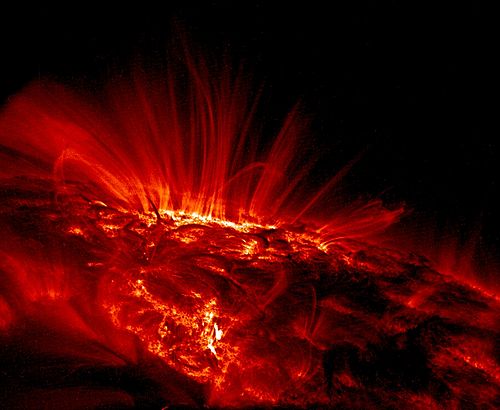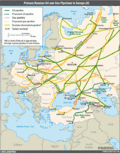Portal:Energy
| Main page | New articles & Tasks |
 The Energy Portal Welcome to Wikipedia's Energy portal, your gateway to energy. This portal is aimed at giving you access to all energy related topics in all of its forms.
|
Page contents: Selected article • Selected image • Selected biography • Did you know? • General images • Quotations • Related portals • Wikiprojects • Major topics • Categories • Help • Associated Wikimedia |
Introduction
Energy (from Ancient Greek ἐνέργεια (enérgeia) 'activity') is the quantitative property that is transferred to a body or to a physical system, recognizable in the performance of work and in the form of heat and light. Energy is a conserved quantity—the law of conservation of energy states that energy can be converted in form, but not created or destroyed. The unit of measurement for energy in the International System of Units (SI) is the joule (J).
Forms of energy include the kinetic energy of a moving object, the potential energy stored by an object (for instance due to its position in a field), the elastic energy stored in a solid object, chemical energy associated with chemical reactions, the radiant energy carried by electromagnetic radiation, the internal energy contained within a thermodynamic system, and rest energy associated with an object's rest mass. These are not mutually exclusive.
All living organisms constantly take in and release energy. The Earth's climate and ecosystems processes are driven primarily by radiant energy from the sun. The energy industry provides the energy required for human civilization to function, which it obtains from energy resources such as fossil fuels, nuclear fuel, and renewable energy.[relevant?] (Full article...)
Selected article
Acceptance of peak oil is far from universal, and the only reliable way to identify its existence will be in retrospect. One alternative scenario is that global production will eventually follow an 'undulating plateau' for one or more decades before declining slowly.
Having accurately predicted the date of peak production in the US petroleum industry, which occurred in 1970, M. King Hubbert, who devised the theory, forecast that the world peak would occur in 1995 'if current trends continue'. Various subsequent predictions have been made as trends have fluctuated in the intervening years. Two milestones have passed, however. The peak of world oilfield discoveries occurred in 1965 and, due world population growth, production per capita peaked in 1979.
The effects of peak oil could be mitigated through conservation and switching to alternative fuels or unconventional oil sources. Such changes would bring their own challenges, ranging from the need to development alternative technologies to potential increases in greenhouse gas emissions.
Selected image

Photo credit: NASA/TRACE
Plasma being channeled by the magnetic field loops of a sunspot.
Did you know?
- The Stuart Shale Oil Plant (pictured) in Australia was in operation only five years?
- Atlantic LNG Company of Trinidad and Tobago operates the world's largest LNG train?
- Despite projections of producing four times as much power as it used in heating, the Riggatron fusion reactor was never built due to a lack of funding?
- In the late 1980s, as many as 50 percent of Argentina's thermal power plants had to be shut down due to lack of maintenance, causing a supply crisis?
- Kashiwazaki-Kariwa Nuclear Power Plant in Japan, the largest nuclear power plant in the world, was shut down after being hit by the Chūetsu offshore earthquake in July 2007?
- The world's largest surface oil shale pyrolysis reactor is Petrosix, operated by the Brazilian oil company Petrobras?
- Russia plans to build several floating nuclear power stations?
- Shale gas, a form of natural gas extracted from shale, may also refer to oil shale gas?
Selected biography
In recognition of Watt's achievements, the SI unit of power, the watt, is named after him.
James Watt was born on 19th of January, 1736 in Greenock, a seaport on the Firth of Clyde. His father was a shipwright, shipowner and contractor, while his mother, Agnes Muirhead, came from a distinguished family and was well-educated. Both were Presbyterians and strong Covenanters. Watt attended school irregularly and instead was mostly schooled at home by his mother.
After studying instrument-making for a year in London, the University of Glasgow offered him the opportunity to set up a small workshop within the university. It was established in 1757. After four years, Watt began to experiment with steam, finally producing a working model steam engine in 1765. Strapped for resources to develop a full-scale engine, Watt was forced to take up employment as a surveyor for eight years. Finally, in 1776, the first engines were installed and working in commercial enterprises.
After further improvements, Watt and foundry owner Matthew Boulton established Boulton and Watt in 1794 to exclusively manufacture steam engines. By 1824 it had produced 1,164 steam engines having a total nominal horsepower of about 26,000.
In the news
- 27 July 2025 – Tariffs in the second Trump administration
- U.S. president Donald Trump and European Commission president Ursula von der Leyen announce a trade deal that would set a reciprocal 15% tariff on all exports and promise to boost European Union investment into the U.S. by $600 billion. The EU also promises to purchase $750 billion in American energy products over an unspecified period of time. (BBC News)
- 15 July 2025 – Indonesia–United States relations
- U.S. president Donald Trump announces a new trade deal with Indonesia, where Indonesia will purchase $15 billion in energy and $4.5 billion in agricultural products, along with 50 Boeing jets. Indonesia will also allow importation of U.S. products without tariffs, while the U.S. will maintain a 19% tariff on all goods coming from Indonesia. (Financial Times)
General images
Quotations
- "Without radical international measures to reduce carbon emissions within the next 10 to 15 years, there is compelling evidence to suggest we might lose the chance to control temperature rises. Failure to act will make an increase of between 2 and 5 degrees [3.6 - 9°F] in average temperatures almost inevitable." – Tony Blair, 2006
- "The question is not whether climate change is happening or not, but whether, in the face of this emergency, we ourselves can change fast enough." – Kofi Annan, 2006
- "I promise you a day will come when our children and grandchildren will look back and they will ask one of two questions. Either they will ask, 'What in God's name were they doing? Didn't they see the evidence?' Or, they may look back and say 'How did they find the uncommon moral courage to rise above politics and redeem the promise of American democracy?'" – Al Gore, 2007, on global warming.
Related portals
WikiProjects
WikiProjects connected with energy:
Other WikiProjects that may be of interest:
Major topics
Major categories
National energy supply, use & conservation
National electricity sector
Politics, economics, environment
- Climate change
- Energy conservation
- Energy economics
- Energy crises
- Energy development
- Energy policy
- Peak oil
Energy sources
- Fuels
- Biofuels
- Fossil fuels
- Fusion power
- Nuclear technology
- Renewable energy
- Energy conversion
- Electric power
- Energy storage
Energy-related design
Scientific usage
Help

Puzzled by energy?
Can't answer your question?
Don't understand the answer?
- Ask at the reference desk
- Read the Wikipedia help pages
For further ideas, to leave a comment, or to learn how you can help improve and update this portal, see the talk page.
Associated Wikimedia
The following Wikimedia Foundation sister projects provide more on this subject:
-
Commons
Free media repository -
Wikibooks
Free textbooks and manuals -
Wikidata
Free knowledge base -
Wikinews
Free-content news -
Wikiquote
Collection of quotations -
Wikisource
Free-content library -
Wikiversity
Free learning tools -
Wiktionary
Dictionary and thesaurus















































































































































































